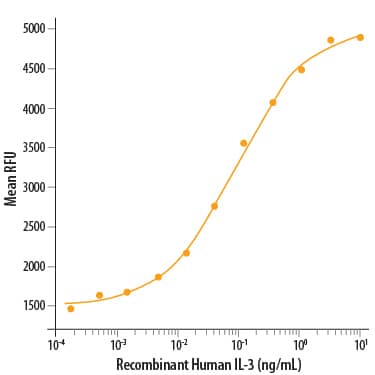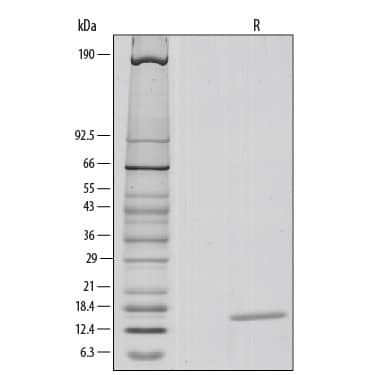Recombinant Human IL-3 Protein Best Seller
R&D Systems, part of Bio-Techne | Catalog # 203-IL

Key Product Details
Product Specifications
Source
Ala20-Phe152, with and without an N-terminal Met
Purity
Endotoxin Level
N-terminal Sequence Analysis
Predicted Molecular Mass
Activity
The ED50 for this effect is 0.02-0.1 ng/mL.
Reviewed Applications
Read 5 reviews rated 5 using 203-IL in the following applications:
Scientific Data Images for Recombinant Human IL-3 Protein
Recombinant Human IL‑3 Protein SEC-MALS.
Recombinant Human IL-3 Protein (Catalog # 203-IL) has a molecular weight (MW) of 14.6 kDa as analyzed by SEC-MALS, suggesting that this protein is a monomer.Recombinant Human IL-3 Protein Bioactivity
Recombinant Human IL-3 (Catalog # 203-IL) stimulates cell proliferation of the TF-1 human erythroleukemic cell line. The ED50 for this effect is 0.02-0.1 ng/mL.Recombinant Human IL-3 Protein SDS-PAGE
1 μg/lane of Recombinant Human IL-3 was resolved with SDS-PAGE under reducing (R) conditions and visualized by silver staining, showing a single band at 14 kDa.Formulation, Preparation and Storage
Carrier Free
What does CF mean?CF stands for Carrier Free (CF). We typically add Bovine Serum Albumin (BSA) as a carrier protein to our recombinant proteins. Adding a carrier protein enhances protein stability, increases shelf-life, and allows the recombinant protein to be stored at a more dilute concentration. The carrier free version does not contain BSA.
What formulation is right for me?In general, we advise purchasing the recombinant protein with BSA for use in cell or tissue culture, or as an ELISA standard. In contrast, the carrier free protein is recommended for applications, in which the presence of BSA could interfere.
Carrier: 203-IL
| Formulation | Lyophilized from a 0.2 μm filtered solution in PBS with BSA as a carrier protein. |
| Reconstitution | Reconstitute at 100 μg/mL in sterile PBS containing at least 0.1% human or bovine serum albumin. |
| Shipping | The product is shipped at ambient temperature. Upon receipt, store it immediately at the temperature recommended below. |
| Stability & Storage | Use a manual defrost freezer and avoid repeated freeze-thaw cycles.
|
Carrier Free: 203-IL/CF
| Formulation | Lyophilized from a 0.2 μm filtered solution in PBS. |
| Reconstitution | Reconstitute at 100 μg/mL in sterile PBS. |
| Shipping | The product is shipped at ambient temperature. Upon receipt, store it immediately at the temperature recommended below. |
| Stability & Storage | Use a manual defrost freezer and avoid repeated freeze-thaw cycles.
|
Background: IL-3
Interleukin 3 is a pleiotropic factor produced primarily by activated T cells that can stimulate the proliferation and differentiation of pluripotent hematopoietic stem cells as well as various lineage committed progenitors. In addition, IL-3 also affects the functional activity of mature mast cells, basophils, eosinophils and macrophages. Because of its multiple functions and targets, it was originally studied under different names, including mast cell growth factor, P-cell stimulating factor, burst promoting activity, multi-colony stimulating factor, thy-1 inducing factor and WEHI-3 growth factor. In addition to activated T cells, other cell types such as human thymic epithelial cells, activated murine mast cells, murine keratinocytes and neurons/astrocytes can also produce IL-3. At the amino acid sequence level, mature human and murine IL-3 share only 29% sequence identity. Consistent with this lack of homology, IL-3 activity is highly species-specific and human IL-3 does not show activity on murine cells.
IL-3 exerts its biological activities through binding to specific cell surface receptors. The high affinity receptor responsible for IL-3 signaling is composed of at least two subunits, an IL-3 specific alpha chain which binds IL-3 with low affinity and a common beta chain that is shared by the IL-5 and GM-CSF high-affinity receptors. Although the beta chain itself does not bind IL-3, it confers high-affinity IL-3 binding in the presence of the alpha chain. Receptors for IL-3 are present on bone marrow progenitors, macrophages, mast cells, eosinophils, megakaryocytes, basophils and various myeloid leukemic cells.
Long Name
Alternate Names
Gene Symbol
UniProt
Additional IL-3 Products
Product Documents for Recombinant Human IL-3 Protein
Product Specific Notices for Recombinant Human IL-3 Protein
For research use only


